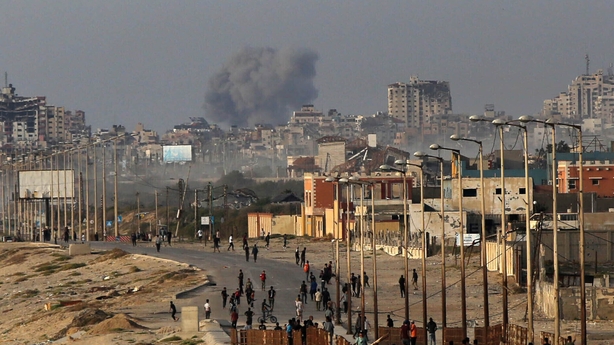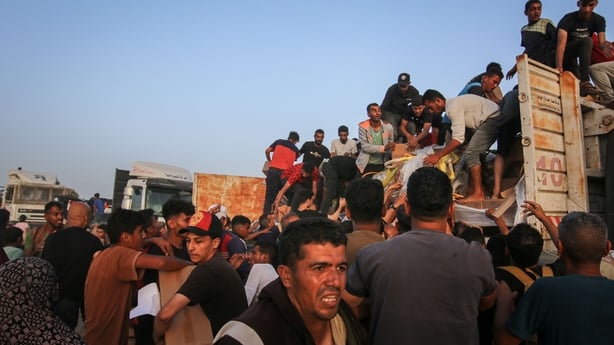An Israeli strike has killed 31 people in central Gaza, the Palestinian territory's civil defence agency said, as US National Security Advisor Jake Sullivan visited Israel for talks on the conflict.
Israeli troops have moved in on Gaza's far-southern city of Rafah, which the army describes as the last Hamas stronghold and where the US says 800,000 civilians have been newly displaced by the fighting.
Hamas' armed wing, the Ezzedine Al-Qassam Brigades, said it was targeting Israeli forces stationed at Rafah crossing - a vital conduit for humanitarian aid that is now closed - with mortar shells.
Israel has also fought and bombed resurgent Hamas forces in northern and central areas of the coastal territory previously considered to be under army control, sparking US warnings that it could become mired in a lengthy counterinsurgency campaign.

In the latest aerial bombardment overnight, Gaza's civil defence agency said an Israeli strike killed 31 people and wounded 20 in a home in the central Nuseirat refugee camp.
Israel's military, which today reported its aircraft had "struck dozens of terror targets" over the past 24 hours, said it was checking the reports.
Witness Yasser Abu Oula told AFP an entire residential complex "was destroyed" and "there are still bodies under the rubble".
Israel's Prime Minister Benjamin Netanyahu has vowed to keep fighting Hamas in Gaza, following its 7 October attack that sparked the war, until the Iran-backed Islamist group is defeated and all remaining hostages are released.
But he has faced intense opposition and calls to announce a plan for Gaza's post-war governance - from top ally Washington and from mass street protests, and now also from members of his war cabinet.
Centrist politician Benny Gantz yesterday threatened to quit the governing hard-right coalition unless Netanyahu approves a post-war "action plan" by 8 June.
Amid the political turmoil,Mr Sullivan was to meet his Israeli counterpart Tzachi Hanegbi and Mr Netanyahu for talks on the brutal Gaza conflict and post-war scenarios, after earlier meeting Saudi de facto ruler Prince Mohammed bin Salman in the kingdom.

Mr Gantz demanded steps to defeat Hamas, to bring home the hostages, and towards the formation of an "American, European, Arab and Palestinian administration that will manage civilian affairs in the Gaza Strip".
Mr Netanyahu dismissed Mr Gantz's comments as "washed-up words", saying they would lead to "a defeat for Israel" and "the establishment of a Palestinian state", which he fiercely opposes.
Washington has pushed for a post-war plan for Gaza involving Palestinians and supported by regional powers, as well as for a broader diplomatic deal under which Israel and regional powerhouse Saudi Arabia would normalise relations.
US President Joe Biden today called for an immediate Gaza ceasefire and said he was pushing for a regional peace deal "to get a two-state solution, the only solution.
We need your consent to load this rte-player contentWe use rte-player to manage extra content that can set cookies on your device and collect data about your activity. Please review their details and accept them to load the content.Manage Preferences
The Gaza war broke out after Hamas's unprecedented 7 October attack on Israel, which resulted in the deaths of more than 1,170 people, mostly civilians, according to an AFP tally based on Israeli official figures.
Hamas also took about 250 hostages during the 7 October attack, of whom 124 remain held in Gaza including 37 the army says are dead.
Israel's retaliatory offensive against Hamas has killed at least 35,456 people in Gaza, also mostly civilians, according to data provided by the Hamas-run territory's health ministry.
'Humanitarian catastrophe'
In central Israel today, mourners gathered for the funeral of German-Israeli Shani Louk, 22, whose body was recovered Thursday from Gaza by troops who also took back three other dead hostages.
Louk was identified shortly after the 7 October attack in online videos showing a woman lying face down in the back of a pick-up truck filled with armed men, before being announced dead later that month.
Israel has imposed a siege on the long-blockaded Gaza, depriving its 2.4 million people of normal access to clean water, food, medicines and fuel, the suffering eased only by sporadic aid shipments by land, air and sea.
"We are living through a humanitarian catastrophe in every sense of the word," said Rafah resident Rinad Joudeh, 41, decrying "destruction, fear and terror" nearly two weeks into the Israeli incursion into the city.
The head of the UN agency helping Palestinians said that "despite all the calls by the international community not to launch an offensive in Rafah, in reality an offensive started on May 6".
Since then, "we have again about half of the population of Gaza being on the road forced to flee" for safety once more, though "we keep saying there is absolutely nowhere to go," UNRWA chief Philippe Lazzarini told reporters in Amman.
"There is absolutely no safe place in the Gaza Strip," he added.

